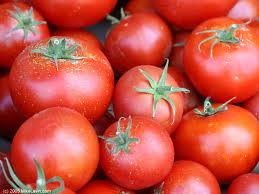Easy Freezing – Tomatoes
The tomato harvest has begun!
Right about now many gardeners are enjoying fresh tomatoes in their salads and sliced tomatoes on their sandwiches. We’re also looking at that basketful of redness on the kitchen counter and trying to figure out what to do next.
 Our motto at Save the Harvest – waste not, want not. Here’s all you need do to save the abundance of tomatoes for future enjoyment.
Our motto at Save the Harvest – waste not, want not. Here’s all you need do to save the abundance of tomatoes for future enjoyment.
Wash the whole tomatoes, place them in a freezer bag or container, and put them in the freezer. That’s all folks!
When the time comes to use these summer gems, just drop them into soup, stew, or a sauce. As they cook you can lift off the skins and pinch out the stem end with a pair of tongs.
Optional Preparation Steps: Remove the stem end with a paring knife before freezing. Dip them in boiling water for 30 seconds or so, then cool the whole tomatoes in ice water to slip off the skins. Now put them in that freezer container, and they’re ready to use in months to come.


This is my first year for home gardening and it’s been very etncxiig. However, my squash and cucumbers have fallen victim to pickleworms!! I wanted to ask if you were successful with bagging your plants to resolve the problem? Do you bag the entire plant or just the blossoms/fruits?Thanks so much!Debbie
Here in southern California we do not have much experience with pickleworms. In fact, The Gardener says “I’ve never heard of pickleworms.” As it happens they are tropical and limited to the southern United States, particularly Florida. The University of Florida has some advice that may answer your question. “It is possible to cover plants with screen or row covers to prevent moths from depositing eggs on the foliage (Webb and Linda 1992). However, because the plants must be pollinated, usually by honey bees, some allowance must be made to leave the plants uncovered. Given the night-flying behavior of the moths and the daytime activities of honeybees, this is not a difficult task on a small planting but is prohibitive on large acreage.”http://entnemdept.ufl.edu/creatures/veg/pickleworm.htm
Good luck, and let us know how you do with your next crop of squash and cucumbers.